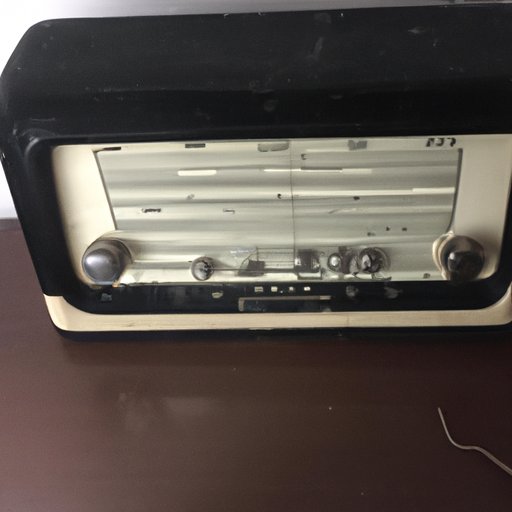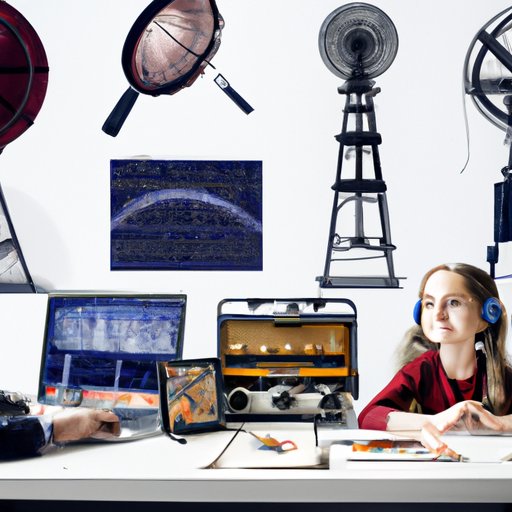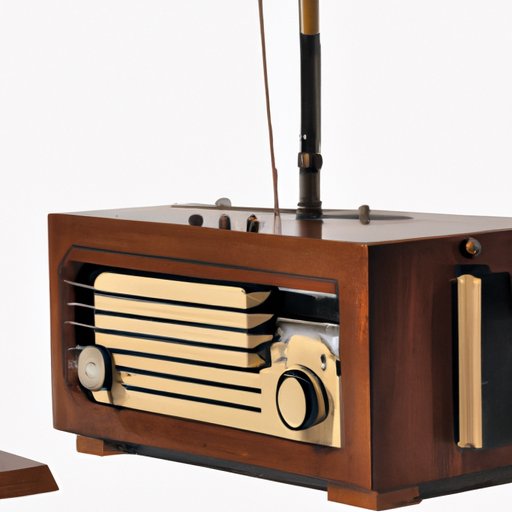Introduction
The invention of the radio has had a huge impact on our lives, transforming the way we communicate and access information. But when was the radio invented? In this article, we’ll explore the history and development of radio technology, tracing its evolution from its early days as an experimental technology to its current use in digital communications.

A Historical Look at the Invention of the Radio
Radio transmissions have been around since the late 19th century. Early experiments in radio transmission were conducted by scientists such as Heinrich Hertz, who demonstrated that radio waves could be transmitted over distances. Other notable inventors, such as Nikola Tesla, also contributed to the development of radio technology.
Who Invented the Radio and When?
Italian inventor Guglielmo Marconi is widely credited with inventing the radio. Marconi developed the first wireless telegraphy system in 1895, which used electromagnetic waves to transmit Morse code messages. This marked the beginning of modern radio communication.
Marconi’s invention sparked a wave of innovation in radio technology. Other notable inventors, such as Edwin Armstrong and Reginald Fessenden, made significant contributions to radio development. Armstrong invented the regenerative circuit, which allowed for greater amplification of radio signals, while Fessenden improved the design of radio receivers.
Tracing the Development of Radio Technology
Early radios were relatively simple devices, consisting of a transmitter, receiver, antenna, and power supply. Over time, radios became more sophisticated, incorporating new components such as filters, amplifiers, and oscillators. Advances in radio technology also enabled the development of more powerful transmitters and receivers.
Contributions from different countries played a major role in the advancement of radio technology. In the US, for example, the Federal Communications Commission (FCC) was established in 1934 to regulate the use of radio frequencies. In the UK, the BBC began broadcasting regular radio programs in 1922.
The Impact of the Invention of the Radio
The invention of the radio has had far-reaching implications for both society and technology. On a social level, radio has transformed the way we communicate and access information. It has enabled us to stay connected with distant friends and family, as well as to receive news and entertainment from around the world.
On a technological level, radio has enabled the development of new technologies such as mobile phones and satellite communications. It has also opened up new opportunities for research, such as radio astronomy and SETI (Search for Extraterrestrial Intelligence).

Exploring the Evolution of Radio Technology
In recent years, radios have become increasingly digital. Digital radio technologies, such as Digital Audio Broadcasting (DAB) and Digital Video Broadcasting (DVB), offer higher quality audio and video than traditional analog radios. Digital radios are also more efficient, allowing for increased coverage and better reception.
New applications for radio technology are also being explored. Radio frequency identification (RFID) technology is being used in a wide range of industries, from retail to healthcare. Radio waves are also used in medical imaging techniques, such as magnetic resonance imaging (MRI).
Celebrating the Pioneering Inventors of the Radio
Guglielmo Marconi is rightly celebrated as the inventor of the radio. His pioneering work laid the foundations for modern radio technology, and he was awarded the Nobel Prize in Physics in 1909 for his achievements. Other notable radio inventors include John Logie Baird, Edwin Armstrong, and Reginald Fessenden.

Examining the Timeline of Radio Invention
The timeline of radio invention can be traced back to the work of Heinrich Hertz in the late 19th century. Key milestones in the development of radio technology include Guglielmo Marconi’s invention of the wireless telegraphy system in 1895, the establishment of the FCC in 1934, and the introduction of digital radio in the 1990s.
Today, radio technology continues to evolve. Advances in digital radio are enabling new applications, such as RFID and medical imaging. The future of radio looks bright, with ongoing developments in digital radio technology.
Conclusion
In this article, we’ve explored the history and development of radio technology, from the pioneering work of Guglielmo Marconi to the ongoing advancements in digital radio. We’ve examined the timeline of radio invention and the impact of its invention on society and technology.
The invention of the radio has revolutionized the way we communicate and access information. Today, radio technology continues to evolve, with ongoing advancements in digital radio technology. As we celebrate the pioneering inventors of the radio, we look forward to the exciting possibilities that lie ahead.
(Note: Is this article not meeting your expectations? Do you have knowledge or insights to share? Unlock new opportunities and expand your reach by joining our authors team. Click Registration to join us and share your expertise with our readers.)
